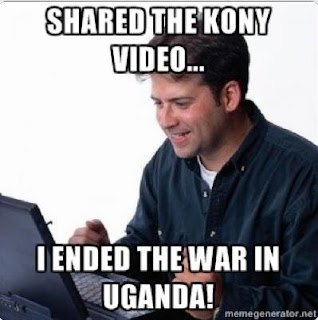 |
| This image is a summary of what you're about to read. http://www.theawl.com/2012/11/the-meme-election |
"Clicktivism", a subset of the concept "slacktivism", refers to using social media to organised activism and/or protest. It allows organizations to quantify their success by keeping track of how many people "clicked" on their petition or other call to action.
This usually leads to events that attract a LOT of attention but very little actual follow through.
The reason clicktivism is considered slack, lazy, and doesn't actually work is that it doesn't involve a real life, physical protest. Critics of clicktivism point to the fact that this new phenomenon turns social movements to resemble advertising campaigns in which messages are tested based on how many clicks they get, in other words how "viral" they go. In order to improve these metrics, messages are reduced to make their "asks easier and actions simpler." This in turn reduces social action to having members that are a list of social media details rather than a real life commitment.
To 'go viral' means "a piece of content spreading just like a virus if people become “infected” when they see it. The infection usually comes from evoked emotions that spur the viewer to share it, so they can relate with other people and discuss how they feel.
Anything can go viral on the Internet, whether it’s a photo, an animation, an article, a quote, a tweet, a person, an animal, an idea, an argument, a coupon, an event or anything else—it has the power to go viral if it appeals enough to the masses and is shareable."- About.com Webtrends (http://webtrends.about.com/od/howtoguides/a/Viral-Online.htm)
Going viral and clicktivism basically allow for activist organisations to dig up a lot of faux support, without necessarily having any real life follow through.
A great example is One "Million" Mums, an organisation that get's a whole lot of airtime in the American media despite being well short of a million strong (under 2500 twitter followers and 121 Facebook likes). The organisation claims to be made up of Mum's who are "sick of the trash in today's media". This is an example of the staggering amount of lazy attention the internet can gain an extremist organisation that doesn't actually have any legs.
I suppose in real life activism is a die hard you're-with-or-against-us kind of thing, whereas with online activism you're just one click away from committing your name to a cause, no action required.
No one event encapsulates the failure of online activism more than Kony 2012. Which we'd remember had the positive message of capturing an African Warlord who uses child soldiers named Joseph Kony. The video went extraordinarily viral, getting millions of views with the plan for people to unite on a particular day and achieve change. By the time the day came around people had lost interest and sadly Kony is still at large today.
 |
| The basic mentality of everyone involved. http://knowyourmeme.com/memes/events/kony-2012 |
I guess what I'm saying is, online activism is hugely hit and miss. This extends to the point that in my opinion many activist organisations can seemingly have a good aim but fail at it purely due to the fact that on Web 2.0 it's bloody hard to hold someone's attention.
As an ending note to all you online activists that waste your time harping on online about your personal bugbears insistently I say sarcastically...
 |
| Not! Get out there and do something or not at all. Produced up with by me using www.quickmeme.com |
No comments:
Post a Comment